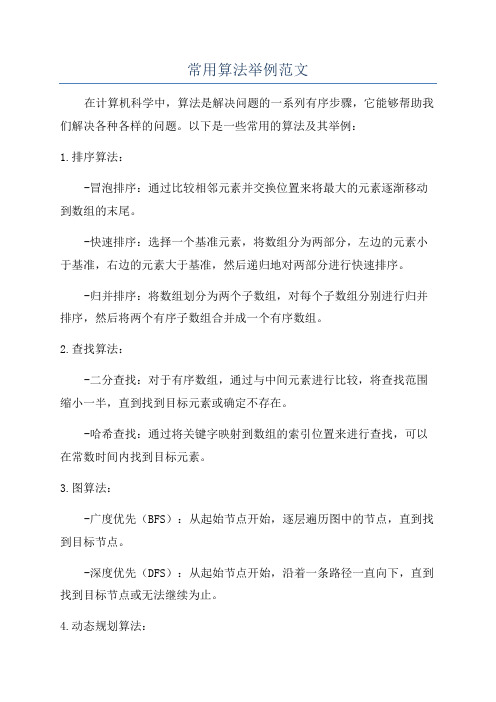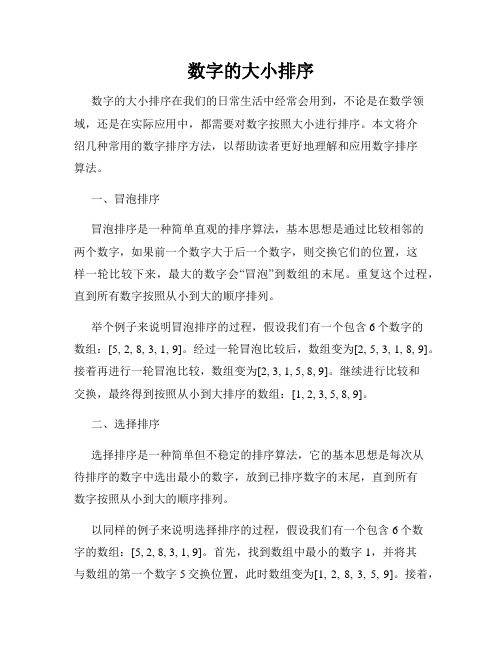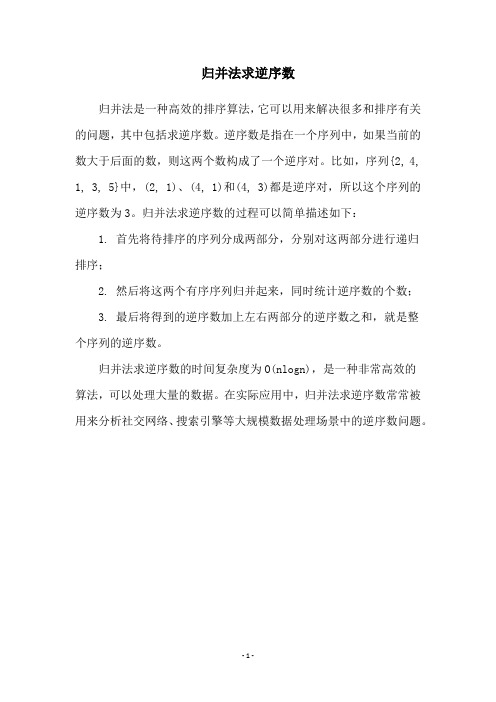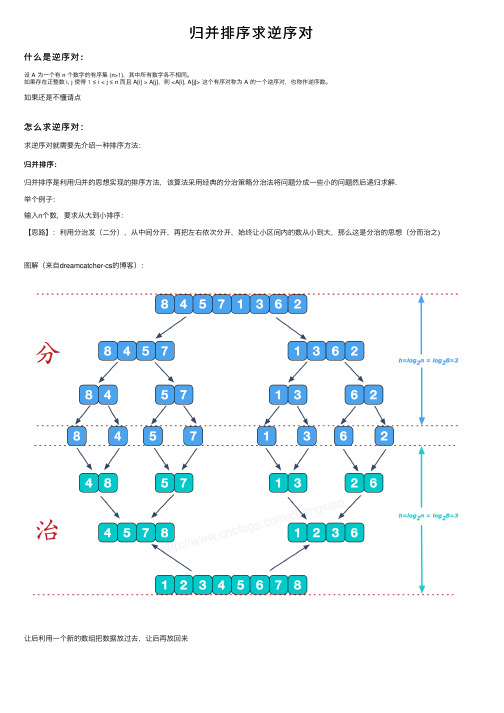简单的归并排序算法例子
mergesort用法

mergesort用法归并排序(Mergesort)是一种经典的排序算法,它基于分治法的思想。
与其他排序算法不同,归并排序的时间复杂度始终保持在 O(nlogn) 的级别,因此在处理大规模数据集时表现出色。
归并排序的用法非常简单,只需将待排序的数组作为输入参数传入归并排序函数即可。
下面是一个示例代码:```pythondef mergesort(arr):# 递归终止条件,数组长度为1时if len(arr) <= 1:return arr# 分割数组为两半mid = len(arr) // 2left = arr[:mid]right = arr[mid:]# 递归调用归并排序函数left = mergesort(left)right = mergesort(right)# 合并左右两个有序数组return merge(left, right)def merge(left, right):result = []l, r = 0, 0# 比较并合并两个数组while l < len(left) and r < len(right):if left[l] < right[r]:result.append(left[l])l += 1else:result.append(right[r])r += 1# 处理剩余的元素result.extend(left[l:])result.extend(right[r:])return result```以上代码展示了一个基于Python的归并排序实现。
使用时,只需调用`mergesort`函数并将待排序数组作为参数传入即可。
该函数会返回一个排序好的新数组,而不会修改原始数组。
归并排序的核心思想是将数组逐步分割为较小的子数组,直至每个子数组的长度为1。
然后,逐个合并这些子数组,直到得到一个完全有序的数组。
这种分而治之的策略保证了归并排序的稳定性和高效性。
常用算法举例范文

常用算法举例范文在计算机科学中,算法是解决问题的一系列有序步骤,它能够帮助我们解决各种各样的问题。
以下是一些常用的算法及其举例:1.排序算法:-冒泡排序:通过比较相邻元素并交换位置来将最大的元素逐渐移动到数组的末尾。
-快速排序:选择一个基准元素,将数组分为两部分,左边的元素小于基准,右边的元素大于基准,然后递归地对两部分进行快速排序。
-归并排序:将数组划分为两个子数组,对每个子数组分别进行归并排序,然后将两个有序子数组合并成一个有序数组。
2.查找算法:-二分查找:对于有序数组,通过与中间元素进行比较,将查找范围缩小一半,直到找到目标元素或确定不存在。
-哈希查找:通过将关键字映射到数组的索引位置来进行查找,可以在常数时间内找到目标元素。
3.图算法:-广度优先(BFS):从起始节点开始,逐层遍历图中的节点,直到找到目标节点。
-深度优先(DFS):从起始节点开始,沿着一条路径一直向下,直到找到目标节点或无法继续为止。
4.动态规划算法:-背包问题:给定一组物品和一个容量限制,选择一些物品放入背包中,使得总价值最大。
-最长公共子序列(LCS):给定两个字符串,找到它们的最长公共子序列的长度。
5.数学算法:-欧几里得算法:计算两个整数的最大公约数。
-快速幂算法:计算一个数的幂运算,通过将指数进行二进制拆分来减少计算次数。
6.字符串处理算法:-KMP算法:通过利用已匹配字符的信息来避免不必要的回溯,实现高效的字符串匹配。
- Boyer-Moore算法:利用模式串中的信息来进行快速的字符串匹配。
7.图像处理算法:-图像平滑算法:通过对图像进行滤波处理,去除图像中的噪声,使其更加平滑。
-图像边缘检测算法:通过检测图像中的边缘信息,突出物体的轮廓。
8.机器学习算法:-K均值聚类算法:将数据集划分为K个簇,使得同一个簇内的数据点之间的距离最小化。
-支持向量机(SVM):将数据集映射到高维空间,并通过找到最优的超平面来实现分类。
自顶向下的二路归并排序算法

自顶向下的二路归并排序算法说到二路归并排序,可能有人会觉得这听起来挺复杂,实际上嘛,它就像是我们做家务时那种“大扫除”模式。
怎么说呢?你把一堆乱七八糟的东西分成两堆,一堆一堆收拾,最后再慢慢合成一个干干净净的地方。
是不是感觉有点意思?嗯,就是这么回事。
那我们就一起看看这个自顶向下的二路归并排序是怎么回事,怎么能让你的数据井井有条,像整理房间一样。
二路归并排序就是把一大堆无序的数据,像是刚刚从抽屉里翻出来的各种物品,一点点给它整理成有序的。
你知道,排序的过程其实就像是找整理房间的顺序,别说,虽然每次都得从上往下整理,但是最后那效果可不就是一目了然嘛!在二路归并排序里,它其实是通过“分而治之”的方式,先把数据分成两半,两半再继续分,一直到每一份数据就只剩下一个元素,觉得“这不就好了嘛”!但这个时候也别高兴得太早,因为后面就是要把这些小部分合并起来了。
嘿嘿,听着好像很简单,其实别小看了这一步。
你把一堆小的部分慢慢合并成大的,过程中就得保持它们之间的有序。
就好像你买了一堆书,每一本书放在不同的堆里,最后要是一本一本拿到一起,你总不能乱七八糟地堆吧,得按照书的顺序,从小到大,一本接着一本地放进去。
你要是从大堆的中间开始,分成两堆,这两堆里又可以继续再分,直到每堆只剩下一个元素,然后再开始按照“从小到大”的顺序合并回来。
合并的时候,别着急,慢慢来,谁小谁先放。
要是你直接乱堆,最后结果肯定不对,试想一下,书堆堆错了,哪还有办法看下去?哎呀,这样说起来,倒有点像是我们小时候做作业分组。
每个人都有自己的任务,先分配工作,每个人拿一小部分,最后再把大家的成果合并成一个完整的答案。
可有趣的是,每一部分拿到手时,我们是可以不用管它是否有序的,反正每个小部分都已经是最简单的状态,至于合并,它只要保持顺序就行。
说白了,这就像是把乱成一锅粥的书本,整理成一排排整整齐齐的书架,最后结果出来那一刻,心里顿时觉得:这下舒服了。
有意思的是,这个过程就是自顶向下的,什么意思呢?从大到小,从整体到局部。
分治算法举例范文

分治算法举例范文分治算法是一种很重要的算法思想,它将一个大的问题划分成较小的子问题,然后分别求解这些子问题,最后将子问题的解合并起来得到原问题的解。
下面我将详细介绍分治算法的几个经典例子。
1. 快速排序(Quick Sort)快速排序是一种经典的使用分治算法的排序算法。
它首先选择一个基准元素,然后将数组划分成两个子数组:小于基准元素的和大于基准元素的。
然后对这两个子数组分别递归地进行快速排序,最后将两个子数组合并起来即可得到有序的数组。
快速排序的时间复杂度为O(nlogn)。
2. 归并排序(Merge Sort)归并排序也是一种利用分治思想的排序算法。
它将待排序的数组划分成两个子数组,然后分别对这两个子数组进行归并排序,最后将两个有序的子数组合并成一个有序的数组。
归并排序的时间复杂度也是O(nlogn)。
3. 汉诺塔问题(Tower of Hanoi)汉诺塔问题是数学领域中一个经典的问题,也可以通过分治算法来解决。
问题的规模是将n个圆盘从一个柱子移动到另一个柱子上,移动时需要遵守以下规则:每次只能移动一个盘子,移动过程中不能将较大的盘子放在较小的盘子上。
可以将问题划分成三个子问题:将前n-1个盘子从起始柱子移动到中间柱子上,将最后一个盘子从起始柱子移动到目标柱子上,最后将前n-1个盘子从中间柱子移动到目标柱子上。
这样就可以递归地求解子问题,最后合并起来得到原问题的解。
4. 最大子数组和问题(Maximum Subarray)最大子数组和问题是求解给定数组中连续子数组的最大和的问题。
可以使用分治算法来解决这个问题。
首先将数组划分成两个子数组,然后分别求解这两个子数组中的最大子数组和。
接下来,需要考虑跨越中点的情况,即包含中点的子数组的最大和。
最后,将这三种情况中的最大值作为最终的结果。
最大子数组和问题的时间复杂度为O(nlogn)。
5. 矩阵乘法(Matrix Multiplication)矩阵乘法也可以通过分治算法来实现。
数字的大小排序

数字的大小排序数字的大小排序在我们的日常生活中经常会用到,不论是在数学领域,还是在实际应用中,都需要对数字按照大小进行排序。
本文将介绍几种常用的数字排序方法,以帮助读者更好地理解和应用数字排序算法。
一、冒泡排序冒泡排序是一种简单直观的排序算法,基本思想是通过比较相邻的两个数字,如果前一个数字大于后一个数字,则交换它们的位置,这样一轮比较下来,最大的数字会“冒泡”到数组的末尾。
重复这个过程,直到所有数字按照从小到大的顺序排列。
举个例子来说明冒泡排序的过程,假设我们有一个包含6个数字的数组:[5, 2, 8, 3, 1, 9]。
经过一轮冒泡比较后,数组变为[2, 5, 3, 1, 8, 9]。
接着再进行一轮冒泡比较,数组变为[2, 3, 1, 5, 8, 9]。
继续进行比较和交换,最终得到按照从小到大排序的数组:[1, 2, 3, 5, 8, 9]。
二、选择排序选择排序是一种简单但不稳定的排序算法,它的基本思想是每次从待排序的数字中选出最小的数字,放到已排序数字的末尾,直到所有数字按照从小到大的顺序排列。
以同样的例子来说明选择排序的过程,假设我们有一个包含6个数字的数组:[5, 2, 8, 3, 1, 9]。
首先,找到数组中最小的数字1,并将其与数组的第一个数字5交换位置,此时数组变为[1, 2, 8, 3, 5, 9]。
接着,在剩下的数字中,找到最小的数字2,并将其与数组的第二个数字8交换位置,此时数组变为[1, 2, 8, 3, 5, 9]。
继续进行比较和交换,最终得到按照从小到大排序的数组:[1, 2, 3, 5, 8, 9]。
三、插入排序插入排序是一种简单且稳定的排序算法,适用于小规模的数字排序。
它的基本思想是从待排序的数字中逐个取出数字,并将其插入到已排序数字的合适位置,直到所有数字按照从小到大的顺序排列。
继续以同样的例子来说明插入排序的过程,假设我们有一个包含6个数字的数组:[5, 2, 8, 3, 1, 9]。
算法—4.归并排序(自顶向下)

算法—4.归并排序(⾃顶向下)1.基本思想将两个有序的数组归并成⼀个更⼤的有序数组,很快⼈们就根据这个操作发明了⼀种简单的递归排序算法:归并排序。
要将⼀个数组排序,可以先(递归地)将它分成两半分别排序,然后将结果归并起来。
你将会看到,归并排序最吸引⼈的性质是它能够保证将任意长度为N的数组排序所需时间和NlogN成正⽐;它的主要缺点则是它所需的额外空间和N成正⽐。
简单的归并排序如下图所⽰:原地归并的抽象⽅法:实现归并的⼀种直截了当的办法是将两个不同的有序数组归并到第三个数组中,实现的⽅法很简单,创建⼀个适当⼤⼩的数组然后将两个输⼊数组中的元素⼀个个从⼩到⼤放⼊这个数组中。
public void merge(Comparable[] a, int lo, int mid, int hi){int i = lo, j = mid+1;//将a[lo..hi]复制到aux[lo..hi]for (int k = lo; k <= hi; k++) {aux[k] = a[k];}//归并回到a[lo..hi]for (int k = lo; k <= hi; k++) {if(i > mid){a[k] = aux[j++];}else if(j > hi){a[k] = aux[i++];}else if(less(aux[j], aux[i])){a[k] = aux[j++];}else{a[k] = aux[i++];}}}以上⽅法会将⼦数组a[lo..mid]和a[mid+1..hi]归并成⼀个有序的数组并将结果存放在a[lo..hi]中。
在归并时(第⼆个for循环)进⾏了4个条件判断:左半边⽤尽(取右半边的元素)、右半边⽤尽(取左半边的元素)、右半边的当前元素⼩于左半边的当前元素(取右半边的元素)以及右半边的当前元素⼤于等于左半边的当前元素(取左半边的元素)。
2.具体算法/*** ⾃顶向下的归并排序* @author huazhou**/public class Merge extends Model{private Comparable[] aux; //归并所需的辅助数组public void sort(Comparable[] a){System.out.println("Merge");aux = new Comparable[a.length]; //⼀次性分配空间sort(a, 0, a.length - 1);}//将数组a[lo..hi]排序private void sort(Comparable[] a, int lo, int hi){if(hi <= lo){return;}int mid = lo + (hi - lo)/2;sort(a, lo, mid); //将左半边排序sort(a, mid+1, hi); //将右半边排序merge(a, lo, mid, hi); //归并结果}} 此算法基于原地归并的抽象实现了另⼀种递归归并,这也是应⽤⾼效算法设计中分治思想的最典型的⼀个例⼦。
归并法求逆序数

归并法求逆序数
归并法是一种高效的排序算法,它可以用来解决很多和排序有关的问题,其中包括求逆序数。
逆序数是指在一个序列中,如果当前的数大于后面的数,则这两个数构成了一个逆序对。
比如,序列{2, 4, 1, 3, 5}中,(2, 1)、(4, 1)和(4, 3)都是逆序对,所以这个序列的逆序数为3。
归并法求逆序数的过程可以简单描述如下:
1. 首先将待排序的序列分成两部分,分别对这两部分进行递归
排序;
2. 然后将这两个有序序列归并起来,同时统计逆序数的个数;
3. 最后将得到的逆序数加上左右两部分的逆序数之和,就是整
个序列的逆序数。
归并法求逆序数的时间复杂度为O(nlogn),是一种非常高效的
算法,可以处理大量的数据。
在实际应用中,归并法求逆序数常常被用来分析社交网络、搜索引擎等大规模数据处理场景中的逆序数问题。
- 1 -。
归并排序PPT课件

.
12
10.6 基数排序
❖ “花色”优先
先分成4堆; 然后,每堆再按“面值”排; 最后,收成一堆。
扑克牌 “排序” 为例
.
13
10.6 基数排序
❖ “面值”优先
先分成13堆; 每堆再按“花色”排;
扑克牌 “排序” 为例
.
14
10.6 基数排序
❖ 多关键码排序
假设有n个记录……的序列 { R1, R2, …,Rn}
.
24
10.6.2 链式基数排序
分配 算法
.
25
10.6.2 链式基数排序
收集 算法
.
26
10.6.2 链式基数排序
❖ 性能分析
若每个关键码有d 位,需要重复执行d 趟“分配” 与“收集”。而每趟对n 个对象进行“分配”, 对r 个队列进行“收集”。总时间复杂度为O(d (n+r))。
若基数r相同,对于数据个数较多而关键码位数
.
5
初始关键字: [49] [38] [65] [97] [76] [13] [27] 一趟归并后: [38 49] [65 97] [13 76] [27] 二趟归并后: [38 49 65 97] [13 27 76] 三趟归并后: [13 27 38 49 65 76 97]
.
6
10.5 归并排序
每个记录Ri中含有d个关键字(Ki0, Ki1, …,Kid-1)。则 有序是指:对于序列中任意两个记录Ri和Rj(1≤i<j≤n) 都满足下列(词典)有序关系:
(Ki0, Ki1, …,Kid-1)< (Kj0, Kj1, …,Kjd-1) 其中K0被称为“最高”位关键字,Kd-1被称为 “最低” 位关键字。
归并排序的优化自底向上的归并排序

归并排序的优化自底向上的归并排序归并排序是一种常用的排序算法,它的核心思想是将待排序的序列递归地分成两个子序列,然后对这两个子序列进行排序,最后将排好序的子序列再合并成一个有序的序列。
归并排序的优化方案之一是自底向上的归并排序。
自底向上的归并排序是一种非递归的归并排序算法,相对于传统的自顶向下的递归方法,它具有一定的优势。
自底向上的归并排序不需要使用递归,而是通过迭代地进行多轮合并操作,从而完成整个排序过程。
这种排序方法的关键在于确定每一轮合并操作的子序列长度。
下面将介绍自底向上的归并排序的算法过程:1. 首先,将待排序的序列按照一定的规则分割成多个子序列,每个子序列的长度为1。
2. 然后,依次对相邻的两个子序列进行合并操作,得到新的有序子序列。
3. 接着,将新的有序子序列再次两两合并,直到得到最终的有序序列。
自底向上的归并排序的关键在于确定每一轮合并操作的子序列长度。
假设待排序序列的长度为n,则初始时子序列的长度为1,然后每一轮合并操作后子序列的长度都会乘以2,直到子序列的长度大于或等于n为止。
自底向上的归并排序的优点在于它不需要额外的空间来保存递归调用时的栈空间,因此可以避免递归调用带来的额外开销。
此外,自底向上的归并排序还可以通过并行化的方式进行实现,提高排序的效率。
总结来说,自底向上的归并排序是一种非递归的归并排序算法,通过迭代地进行多轮合并操作,最终得到有序的序列。
它的优势在于不需要额外的空间和递归调用带来的开销,同时还可以通过并行化的方式提高排序的效率。
归并排序的优化方案之一,自底向上的归并排序,是一种高效的排序算法。
逆序对 归并排序

逆序对归并排序
逆序对是一种常见的排序问题,在排序的过程中,一个数字序列中每对记述元素的排列位置都符合该对元素的大小关系。
我们将其中较小的元素叫做逆序对。
例如,对于一个序列{2,4,3,1,5},逆序对有(2,1),(4,3),(4,1),(3,1)。
(2,1)是因为2在1前面,(4,3)是因为4在3前面,(4,1)是因为4在1前面,(3,1)是因为3在1前面。
归并排序是一种经典的排序算法。
在算法的过程中,将一个序列分成两个子序列,分别进行排序,最后将两个已经有序的子序列合并成一个有序的序列。
那么在归并排序的过程中,怎样计算逆序对呢?
在对序列进行归并排序时,我们对每个子序列进行排序,并将子序列合并。
在合并子序列时,我们将子序列分成两个部分:左边的子序列和右边的子序列。
我们也将左边和右边的子序列分别排序,然后将它们合并成一个排序完毕的序列。
在合并左边和右边的子序列时,我们同时遍历两个子序列的元素。
假设左边的子序列的下标为i,右边子序列的下标为j,那么当左边子序列中的某个元素a[i]大于右边子序列中的某个元素a[j]时,产生的逆序对数为左边子序列中剩余的元素个数。
在合并完左边和右边的子序列后,我们得到的序列已经排好序了。
我们将所有产生的逆序对数加起来就是该序列的逆序对数。
我们可以通过递归将序列分成更小的子序列,然后再利用上面的方法计算逆序对数。
归并排序求逆序对

归并排序求逆序对什么是逆序对:设 A 为⼀个有 n 个数字的有序集 (n>1),其中所有数字各不相同。
如果存在正整数 i, j 使得1 ≤ i < j ≤ n ⽽且 A[i] > A[j],则 <A[i], A[j]> 这个有序对称为 A 的⼀个逆序对,也称作逆序数。
如果还是不懂请点怎么求逆序对:求逆序对就需要先介绍⼀种排序⽅法:归并排序:归并排序是利⽤归并的思想实现的排序⽅法,该算法采⽤经典的分治策略分治法将问题分成⼀些⼩的问题然后递归求解.举个例⼦:输⼊n个数,要求从⼤到⼩排序:【思路】:利⽤分治发(⼆分),从中间分开,再把左右依次分开,始终让⼩区间内的数从⼩到⼤,那么这是分治的思想(分⽽治之)图解(来⾃dreamcatcher-cs的博客):让后利⽤⼀个新的数组把数据放过去,让后再放回来代码:#include<iostream>#include<cstdio>#include<algorithm>#include<cmath>#include<queue>#include<stack>#include<vector>#include<map>#include<string>#include<cstring>using namespace std;const int maxn=999999999;const int minn=-999999999;inline int read() {char c = getchar();int x = 0, f = 1;while(c < '0' || c > '9') {if(c == '-') f = -1;c = getchar();}while(c >= '0' && c <= '9') x = x * 10 + c - '0', c = getchar(); return x * f;}int n,a[100152],b[100250];void doit(int l,int mid,int r) {int i,j,k;int n1=mid-l+1;int n2=r-mid;int L[n1],R[n2];for (i=0; i<n1; i++)L[i]=a[l+i];for (j=0; j<n2; j++)R[j]=a[mid+j+1];i=0;j=0;k=l;while(i<n1&&j<n2) {if(L[i]<=R[j]) {a[k]=L[i];i++;} else {a[k]=R[j];j++;}k++;}while(i<n1) {a[k]=L[i];i++;k++;}while(j<n2) {a[k]=R[j];j++;k++;}}void my_sort(int l,int r) { //分if(l<r) {int mid=(l+r)/2;my_sort(l,mid);my_sort(mid+1,r);doit(l,mid,r);}}int main() {cin>>n;for(int i=0; i<n; ++i) {cin>>a[i];}my_sort(0,n-1);for(int i=0; i<n; ++i) {cout<<a[i]<<"";}return0;}接下来终于到逆序对了:放两个题⽬:【题⽬描述】Prince对他在这⽚⼤陆上维护的秩序感到满意,于是决定启程离开艾泽拉斯。
二路归并排序算法

⼆路归并排序算法将两个按值有序序列合并成⼀个按值有序序列,则称之为⼆路归并排序,下⾯有⾃底向上和⾃顶向下的两种排序算法,⾃顶向下的排序在本⽂末讲述,使⽤递归实现,代码较简洁,经供参考。
1. 归并⼦算法:把位置相邻的两个按值有序序列合并成⼀个按值有序序列。
例如把序列 X[s..u] = {3, 12, 23, 32}和序列 X[u+1..v] = {2, 5, 8, 99} 合并成序列Z[s..v] = {2, 3, 5, 8, 12, 23, 32, 99}, 注意合并前的元素都位于同⼀个有序序列的相邻位置,合并后的有序序列的下标与合并前的序列总的起始下标相同。
算法过程中需要三个整型变量,i ⽤来遍历归并的前⼀个有序序列,其初始位置是s;j ⽤来遍历归并的后⼀个有序序列,其初始值是u+1;q ⽤来指出归并后得到的有序序列的末尾元素的位置,其初始值是s。
当遍历完成其中的⼀个有序序列之后,只需把另⼀个未结束有序序列的剩余元素复制到合并后的有序序列的末尾。
看代码:[cpp]1. //将有序的X[s..u]和X[u+1..v]归并为有序的Z[s..v]2. void merge(int X[], int Z[], int s, int u, int v)3. {4. int i, j, q;5. i = s;6. j = u + 1;7. q = s;8.9. while( i <= u && j<= v )10. {11. if( X[i] <= X[j] )12. Z[q++] = X[i++];13. else14. Z[q++] = X[j++];15. }16.17. while( i <= u ) //将X中剩余元素X[i..u]复制到Z18. Z[q++] = X[i++];19. while( j <= v ) //将X中剩余元素X[j..v]复制到Z20. Z[q++] = X[j++];21. }2. ⼀趟归并扫描⼦算法:将参加排序的序列分成若⼲个长度为 t 的,且各⾃按值有序的⼦序列,然后多次调⽤归并⼦算法merge将所有两两相邻成对的⼦序列合并成若⼲个长度为2t 的,且各⾃按值有序的⼦序列。
归并排序简单例子

归并排序简单例子
嘿,朋友们!今天咱就来唠唠归并排序这个超有意思的玩意儿,我给你举个超简单的例子哈。
想象一下,你有一堆乱七八糟的卡片,就像你的思绪有时候也乱得很一样。
现在你要把这些卡片按照数字大小排好序,这可不容易吧?但归并排序就能帮你搞定这个难题呀!
比如说,你有这么一组数字:5,2,8,1,4。
归并排序就像是一个超
厉害的指挥官,它先把这些数字分成两半,左边是5,2,右边是8,1,4。
然后它再继续细分左边变成 5 和 2,右边分成 8 和 1,4。
这就好像把一个
大难题拆分成了一个个小问题,是不是很神奇?
接下来呢,它开始比较啦!哎呀呀,2 比 5 小,那就先放 2 呗;8 比 1 大,那就放 1 呀。
然后再把分好的两部分合起来。
嘿,这不就有点模样了嘛!
归并排序就是这么一步一步,有条不紊地帮你把这些数字整得服服帖帖的。
就好像你收拾自己的房间一样,一点一点把东西放对地方。
你看,这么难搞的事情,归并排序都能处理好,多牛呀!它可不像你有时候做事毛毛躁躁的。
而且呀,归并排序不管面对多少数字,它都不慌不忙,一步步来,多有耐心呀,你能做到吗?哈哈!
在我看来啊,归并排序真的是一种超级实用又有趣的算法,它能把混乱变得有序,就像在混乱的生活中给你指明一条清晰的路一样。
所以啊,一定要好好理解归并排序呀,它能给你带来很多惊喜呢!。
归并排序的详细过程

归并排序的详细过程归并排序是一种常见的排序算法,它通过将待排序序列分成若干个子序列,分别对每个子序列进行排序,然后再将排好序的子序列合并成最终的有序序列。
下面将详细介绍归并排序的过程。
1. 分解阶段:将待排序的序列不断二分,直到每个子序列只剩下一个元素为止。
这个过程可以使用递归来实现。
例如,对于序列[8, 4, 2, 5, 1, 3, 6, 7],先将其二分为[8, 4, 2, 5]和[1, 3, 6, 7]两个子序列,再将这两个子序列继续二分,直到每个子序列只剩下一个元素。
2. 合并阶段:将相邻的两个子序列合并成一个有序序列。
具体的合并过程如下:- 创建一个临时数组来存放合并后的序列。
- 初始化两个指针,分别指向两个子序列的起始位置。
- 依次比较两个子序列中的元素,将较小的元素放入临时数组中,并将指向该元素的指针后移一位。
- 当其中一个子序列的指针移到末尾时,将另一个子序列中剩余的元素依次放入临时数组中。
- 将临时数组中的元素复制回原始序列的对应位置。
以序列[8, 4, 2, 5, 1, 3, 6, 7]为例,将其分解为[8, 4, 2, 5]和[1, 3, 6, 7]两个子序列,然后对这两个子序列进行合并。
首先比较两个子序列的第一个元素,4小于8,将4放入临时数组中,并将指向4的指针后移一位。
接着比较2和8,2小于8,将2放入临时数组中,并将指向2的指针后移一位。
继续比较5和8,5小于8,将5放入临时数组中,并将指向5的指针后移一位。
此时第一个子序列中的元素已经全部放入临时数组中。
接下来比较两个子序列的第一个元素,3小于1,将3放入临时数组中,并将指向3的指针后移一位。
继续比较6和1,6大于1,将1放入临时数组中,并将指向1的指针后移一位。
接着比较6和3,6大于3,将3放入临时数组中,并将指向3的指针后移一位。
最后比较6和7,7小于6,将7放入临时数组中,并将指向7的指针后移一位。
此时第二个子序列中的元素已经全部放入临时数组中。
归并排序算法图文详解(模版使用)

归并排序算法图⽂详解(模版使⽤)算法介绍引⽤百度百科的介绍。
归并排序(Merge Sort)是建⽴在操作上的⼀种有效,稳定的排序算法,该算法是采⽤(Divide and Conquer)的⼀个⾮常典型的应⽤。
将已有序的⼦合并,得到完全有序的序列;即先使每个⼦序列有序,再使⼦序列段间有序。
若将两个有序表合并成⼀个有序表,称为⼆路归并。
算法描述归并排序,采⽤是分治法,先将数组分成⼦序列,让⼦序列有序,再将⼦序列间有序,合并成有序数组。
算法描述:(1)把长度为n的输⼊序列分成长度 n/2的⼦序列;(2)对两个⼦序列采⽤归并排序;(3)合并所有⼦序列。
算法实现void mergeSortInOrder(int[] arr,int bgn,int mid, int end){int l = bgn, m = mid +1, e = end;//相当于对⼀个数组的前半部分和后半部分进⾏排序排序,从开始的只有两个数,到后⾯//因为基本有序,所以只需要进⾏合并就⾏int[] arrs = new int[end - bgn + 1];int k = 0;//进⾏有序合并while(l <= mid && m <= e){if(arr[l] < arr[m]){arrs[k++] = arr[l++];}else{arrs[k++] = arr[m++];}}//如果前半部分⼤的⽐较多,直接接在后⾯while(l <= mid){arrs[k++] = arr[l++];}//如果后半部分⼤的⽐较多,直接接在后⾯while(m <= e){arrs[k++] = arr[m++];}//对我们原来的数组进⾏值的覆盖for(int i = 0; i < arrs.length; i++){arr[i + bgn] = arrs[i];}}void mergeSort(int[] arr, int bgn, int end){//如果开始指针⼤于结束指针,结束if(bgn >= end){return;}//通过分治将我们的数组分成多个⼩数组int mid = (bgn + end) >> 1;mergeSort(arr,bgn,mid);mergeSort(arr,mid + 1, end);//对我们的⼩数组进⾏排序mergeSortInOrder(arr,bgn,mid,end);}算法分析稳定排序外排序(需要消耗额外的内存)时间复杂度O(nlogn),空间复杂度为O(1)。
归并排序详解及应用

归并排序详解及应用归并排序(Merge sort)是一种基于分治策略的经典排序算法。
它将待排序数组分成两个子数组,分别对子数组进行排序,然后将已排序的子数组合并,最终得到完整的有序数组。
归并排序的详细步骤如下:1.分解:将待排序数组不断二分,直到最小单位为单个元素,即子数组长度为1。
2.合并:逐层对已排序的子数组进行合并操作,合并过程中将两个有序子数组合并为一个有序的大数组。
合并操作的具体步骤如下: a. 创建一个辅助数组,用于存放合并后的数组。
b. 定义三个指针,分别指向两个子数组的起始位置和辅助数组的起始位置。
c. 比较两个子数组的当前元素,将较小的元素放入辅助数组,并将相应指针后移。
d. 重复上述比较和放入操作,直到一个子数组的所有元素都放入了辅助数组。
e. 将另一个子数组剩余的元素放入辅助数组。
f. 将辅助数组中的元素复制回原数组对应的位置。
3.递归:不断重复分解和合并的过程,直到最终得到完整的有序数组。
归并排序的时间复杂度为O(nlogn),其中n是待排序数组的长度。
由于归并排序是基于分治策略,它的稳定性和效率使其成为常用的排序算法之一。
归并排序除了基本的排序功能,还具有其他一些应用。
以下是一些常见的应用场景:1.外部排序:归并排序适用于需要对大规模数据进行排序的情况,它可以将数据分割为适合内存容量的块,分别进行排序,然后将排序好的块合并成最终的有序结果。
2.链表排序:与其他排序算法相比,归并排序对链表的排序更加适用。
由于归并排序只需要改变指针的指向来完成合并操作,对于链表而言操作较为高效。
3.并行计算:归并排序可以进行并行化处理,将待排序数组分割为多个部分,分别在不同的处理器或线程上进行排序,然后将排序好的部分合并。
4.大数据处理:在大数据处理中,归并排序可以结合MapReduce等分布式计算框架,将数据分割、排序和合并操作分布在多个计算节点上,加快处理速度。
总的来说,归并排序是一种高效、稳定的排序算法,它的优点在于适用于各种数据类型的排序,并且可以应用到一些特定的场景和算法问题中。
归并排序算法实现归并排序的原理和时间复杂度分析

归并排序算法实现归并排序的原理和时间复杂度分析归并排序是一种经典的排序算法,它采用分治策略来解决排序问题。
它的原理是将一个数组分成两个子数组,然后对每个子数组进行排序,最后再合并两个已排序的子数组。
根据分治的思想,我们可以递归地将问题分解为较小的子问题,通过解决子问题并将结果合并来解决原始问题。
1. 归并排序的原理归并排序的原理可以分为三个步骤:分解、解决和合并。
(1) 分解:首先,将待排序的数组分解为两个子数组,直到每个子数组的长度为1。
例如,对于数组[5, 2, 7, 1],我们将其分解为[5, 2]和[7, 1]两个子数组。
(2) 解决:接下来,对每个子数组递归地应用归并排序算法,直到子数组的长度为1为止。
递归的终止条件是数组长度为1时,这时数组就是有序的。
对于[5, 2]和[7, 1]两个子数组,我们将其分别排序得到[2, 5]和[1, 7]。
(3) 合并:最后,将两个已排序的子数组合并成一个有序的数组。
合并过程中,我们比较两个子数组的第一个元素,将较小的元素放入结果数组,并移动指针,直到一个子数组已经全部放入结果数组中,然后将另一个子数组中的剩余元素放入结果数组。
对于[2, 5]和[1, 7]两个已排序的子数组,我们将其合并得到最终的排序结果[1, 2, 5, 7]。
通过不断地分解、解决和合并的步骤,归并排序算法最终能够对整个数组进行排序。
2. 时间复杂度分析归并排序算法的时间复杂度可以通过递推关系式来分析。
假设待排序的数组长度为n,则归并排序的时间复杂度可以表示为T(n)。
(1) 分解:每次分解过程将数组划分为两个子数组,所以分解过程的时间复杂度为O(log n)。
其中,log n表示以2为底n的对数。
(2) 解决:对每个子数组的解决过程需要的时间复杂度为O(n)。
因为每个子数组的长度为n/2,所以花费的时间为O(n/2)。
递归地应用归并排序算法,最后得到的时间复杂度为O(n)。
(3) 合并:在合并过程中,我们需要比较每个元素并放入结果数组中,所以合并过程的时间复杂度为O(n)。
C语言实现归并排序算法

C语言实现归并排序算法C语言实现归并排序算法归并排序是创建在归并操作上的一种有效的排序算法。
下面店铺为大家整理了C语言实现归并排序算法,希望能帮到大家!归并排序(Merge sort)是创建在归并操作上的一种有效的排序算法。
该算法是采用分治法(Divide and Conquer)的一个非常典型的应用。
一个归并排序的例子:对一个随机点的链表进行排序算法描述归并操作的过程如下:申请空间,使其大小为两个已经排序序列之和,该空间用来存放合并后的序列设定两个指针,最初位置分别为两个已经排序序列的起始位置比较两个指针所指向的元素,选择相对小的元素放入到合并空间,并移动指针到下一位置重复步骤3直到某一指针到达序列尾将另一序列剩下的所有元素直接复制到合并序列尾特点:归并排序是稳定的`排序.即相等的元素的顺序不会改变, 速度仅次于快速排序,但较稳定。
归并操作归并操作(merge),也叫归并算法,指的是将两个顺序序列合并成一个顺序序列的方法。
如:设有数列 [6,202,100,301,38,8,1]初始状态:6, 202, 100, 301, 38, 8, 1第一次归并后:[6, 202], [100, 301], [8, 38], [1],比较次数:3;第二次归并后:[6, 100, 202, 301],[1, 8, 38],比较次数:4;第三次归并后:[1, 6, 8, 38, 100, 202, 301],比较次数:4;总的比较次数为:3+4+4=11,;逆序数为14;算法实现// Completed on 2014.10.11 17:20// Language: C99//// 版权所有(C)codingwu (mail: ****************)// 博客地址:/archimedes/#include#includevoid merge_sort(int *list, const int first, const int last){ int len= last-first+1; int left_min,left_max; //左半区域边界 int right_min,right_max; //右半区域边界 int index; int i; int *tmp; tmp = (int *)malloc(sizeof(int)*len); if( tmp == NULL || len <= 0 ) return; for( i = 1; i < len; i *= 2 ) { for( left_min = 0; left_min < len - i; left_min = right_max) { int j; right_min = left_max = left_min + i; right_max = left_max + i; j = left_min; if ( right_max > len ) right_max = len; index = 0; while( left_min < left_max && right_min < right_max ) { tmp[index++] = (list[left_min] > list[right_min] ? list[right_min++] : list[left_min++]); } while( left_min < left_max ) { list[--right_min] = list[--left_max]; } while( index > 0 ) { list[--right_min] = tmp[--index]; } } } free(tmp);}int main(){ int a[] = {288, 52, 123, 30, 212, 23, 10, 233}; int n, mid; n = sizeof(a) / sizeof(a[0]); mid = n / 2; merge_sort(a, 0, n - 1); for(int k = 0; k < n; k++) printf("%d ", a[k]); printf("n"); return 0;}使用递归实现:// Completed on 2014.10.11 18:20// Language: C99//// 版权所有(C)codingwu (mail: ****************)// 博客地址:/archimedes/#include#includevoid merge(int *array,const int first, const int mid, const int last){ int i,index; int first1,last1; int first2,last2; int *tmp; tmp = (int *)malloc((last-first+1)*sizeof(int)); if( tmp == NULL ) return; first1 = first; last1 = mid; first2 = mid+1; last2 = last; index = 0; while( (first1 <= last1) && (first2 <= last2) ) { if( array[first1] < array[first2] ) { tmp[index++] = array[first1]; first1++; } else{ tmp[index++] = array[first2]; first2++; } } while( first1 <= last1 ) { tmp[index++]= array[first1++]; } while( first2 <= last2 ) { tmp[index++] = array[first2++]; } for( i=0; i<(last-first+1); i++) { array[first+i] = tmp[i]; } free(tmp);}void merge_sort(int *array, const int first, const int last){ int mid = 0; if(first < last) { mid = (first + last) / 2; merge_sort(array, first, mid); merge_sort(array, mid + 1, last); merge(array, first, mid, last); }}int main(){ int a[] = {288, 52, 123, 30, 212, 23, 10, 233}; int n, mid; n = sizeof(a) / sizeof(a[0]); mid = n / 2; merge_sort(a, 0, n - 1); for(int k = 0; k < n; k++) printf("%d ", a[k]); printf("n"); return 0;}【C语言实现归并排序算法】。
归并排序,时间复杂度nlogn

归并排序,时间复杂度nlogn思路:/*考点:1. 快慢指针;2. 归并排序。
此题经典,需要消化吸收。
复杂度分析:T(n) 拆分 n/2, 归并 n/2 ,⼀共是n/2 + n/2 = n/ \ 以下依此类推:T(n/2) T(n/2) ⼀共是 n/2*2 = n/ \ / \T(n/4) ........... ⼀共是 n/4*4 = n⼀共有logn层,故复杂度是 O(nlogn)因为题⽬要求复杂度为O(nlogn),故可以考虑归并排序的思想。
归并排序的⼀般步骤为:1)将待排序数组(链表)取中点并⼀分为⼆;2)递归地对左半部分进⾏归并排序;3)递归地对右半部分进⾏归并排序;4)将两个半部分进⾏合并(merge),得到结果。
所以对应此题⽬,可以划分为三个⼩问题:1)找到链表中点(快慢指针思路,快指针⼀次⾛两步,慢指针⼀次⾛⼀步,快指针在链表末尾时,慢指针恰好在链表中点);2)写出merge函数,即如何合并链表。
(见merge-two-sorted-lists ⼀题解析)3)写出mergesort函数,实现上述步骤。
1234 5 6 7 8 9 10 11 12 13 14 15 16 17 18 19 20 21 22 23 24 25 26 27 28 29 30 31 32 33 34 35 36 37 38 39 40 41 42 43class Solution {public:ListNode* findMiddle(ListNode* head){ListNode* chaser = head;ListNode* runner = head->next;while(runner != NULL && runner->next != NULL){ chaser = chaser->next;runner = runner->next->next;}return chaser;}ListNode* mergeTwoLists(ListNode* l1, ListNode* l2) { if(l1 == NULL){return l2;}if(l2 == NULL){return l1;}ListNode* dummy = new ListNode(0);ListNode* head = dummy;while(l1 != NULL && l2 != NULL){if(l1->val > l2->val){head->next = l2;l2 = l2->next;}else{head->next = l1;l1 = l1->next;}head = head->next;}if(l1 == NULL){head ->next = l2;}if(l2 == NULL){head->next = l1;}return dummy->next;}ListNode* sortList(ListNode* head) {if(head == NULL || head ->next == NULL){return head;}ListNode* middle = findMiddle(head);ListNode* right = sortList(middle->next);43 44 45 46 47 48 49 50 51 52 ListNode* right = sortList(middle->next); middle -> next = NULL;ListNode* left = sortList(head);return mergeTwoLists(left, right);}};。
归并排序复杂度公式

归并排序复杂度公式归并排序是一种在计算机科学中常用的排序算法,它的复杂度公式可不是那么简单就能理解的哈。
咱们先来说说啥是归并排序。
想象一下,你有一堆乱七八糟的书,要把它们按照书名的字母顺序排好。
归并排序就像是先把这堆书分成两小堆,再把这两小堆分别排好序,最后把它们合并起来。
归并排序的时间复杂度主要看它进行了多少次比较和移动操作。
经过一番分析,归并排序的平均时间复杂度和最坏时间复杂度都是 O(nlog n) 。
就拿我之前教学生的时候来说吧,有个小家伙,叫明明,特别聪明,但就是对这归并排序的复杂度公式有点迷糊。
我就给他打了个比方,我说:“明明啊,这归并排序就好比咱们学校运动会的接力比赛。
分成小组跑,小组内先排好顺序,最后再把小组的成绩汇总起来。
这分组、排序、汇总的过程,就对应着归并排序的步骤。
而时间复杂度呢,就像是计算整个比赛完成需要的大概时间。
”明明听了之后,眼睛瞪得大大的,好像有点明白了。
可过了一会儿,他又皱起眉头问:“那为啥是 O(n log n) 呢?”我接着给他解释:“你看啊,每次把数据分成两半,这就像是不断把路程砍半。
砍的次数就和对数有关。
而每次合并的时候,都要对几乎所有的数据进行操作,所以就有了 n 这个部分。
”经过反复地讲解和练习,明明终于搞懂了。
从那以后,每次遇到归并排序的问题,他都能很快地算出复杂度。
其实啊,理解归并排序的复杂度公式,关键在于理解它的分治思想和操作步骤。
别一看到公式就头疼,把它和生活中的例子联系起来,就会发现也没那么难。
对于学习算法的同学们来说,可别被这看起来复杂的公式吓住。
多思考、多练习,慢慢地就能掌握其中的奥秘啦。
就像明明一样,只要肯钻研,没有搞不定的难题!总之,归并排序复杂度公式虽然有点复杂,但只要咱们用心去理解,就能掌握它的精髓,在算法的世界里畅游无阻。
- 1、下载文档前请自行甄别文档内容的完整性,平台不提供额外的编辑、内容补充、找答案等附加服务。
- 2、"仅部分预览"的文档,不可在线预览部分如存在完整性等问题,可反馈申请退款(可完整预览的文档不适用该条件!)。
- 3、如文档侵犯您的权益,请联系客服反馈,我们会尽快为您处理(人工客服工作时间:9:00-18:30)。
import java.util.ArrayList;
import java.util.Arrays;
import java.util.Collections;
import java.util.List;
import java.util.Random;
public class GuiBing {
public static void main(String[] args) throws Exception { int datalength=1000000;
GuiBing gui=new GuiBing();
int[] array1=gui.createArray(datalength);
int[] array2=gui.createArray(datalength);
Thread.sleep(20000);
long startTime = System.nanoTime();//纳秒精度
long begin_freeMemory=Runtime.getRuntime().freeMemory(); int[] final_array=gui.guibing(array1,array2);
boolean result=gui.testResult(final_array);
long end_freeMemory=Runtime.getRuntime().freeMemory(); System.out.println("result===="+result);
long estimatedTime = System.nanoTime() - startTime;
System.out.println("elapsed time(纳秒精
度):"+estimatedTime/100000000.0);
System.out.println("allocated
memory:"+(begin_freeMemory-end_freeMemory)/1000.0+" KB"); Thread.sleep(20000);
}
/**
* 显示数组的内容
* @param array
*/
private static void dispalyData(int[] array) {
for(int i=0;i<array.length;i++)
{
System.out.printf("%-6d",array[i]);
}
System.out.println("");
}
/**
* 测试结果
* @param final_array
* @return
*/
private boolean testResult(int[] final_array) {
int length=final_array.length;
for(int i=0;i<length-1;i++){
if(final_array[i]>final_array[i+1]) return false;
}
return true;
}
/**
* 算法的思想是:
* 数组a是有序的,从小到大
* 数组b是有序的,从小到大
* 归并两个数组到一个中
* 1 从两个数组的第一个元素比较,小的放在新数组的第一个位置,小的元素所在的数组索引加1,依此比较
* 直到结束
* 2 将剩余元素直接拷贝到新的数组内
**/
private int[] guibing(int[] a, int[] b) {
int[] temp=new int[a.length*2];
int i=0,j=0,a_length=a.length,b_length=a.length,k=0;
arraySort(a);
arraySort(b);
//dispalyData(a);
//dispalyData(b);
while(i<a_length && j<b_length){
if(a[i]<b[j]){
temp[k]=a[i];
k++;i++;
}else{
temp[k]=b[j];
k++;j++;
}
}
while(i<a_length){
temp[k++]=a[i++];
}
while(j<b_length){
temp[k++]=b[j++];
}
return temp;
}
/**
* 用集合类Collections升序排列
* @param a
*/
@SuppressWarnings({"unchecked","unused"})
private void sort(final int[] a){
List list=new ArrayList();
for(int i=0;i<a.length;i++)
list.add(a[i]);
Collections.sort(list);
Object[] temp=list.toArray();
for(int i=0;i<temp.length;i++){
a[i]=(Integer)temp[i];
}
}
/**
* 使用系统类对数组以升序排序。
* @param a
*/
@SuppressWarnings({"unchecked","unused"})
private void arraySort(final int[] a){
Arrays.sort(a);
}
/**
* 根据参数length创建一个随机的整数数组。
数组中的值的小于length*2 * @param length
* @return
*/
private int[] createArray(int length) {
Random random=new Random();
int[] temp=new int[length];
int j=0;
while(j<length){
temp[j++]=random.nextInt(length<<2);
}
return temp;
} }。
